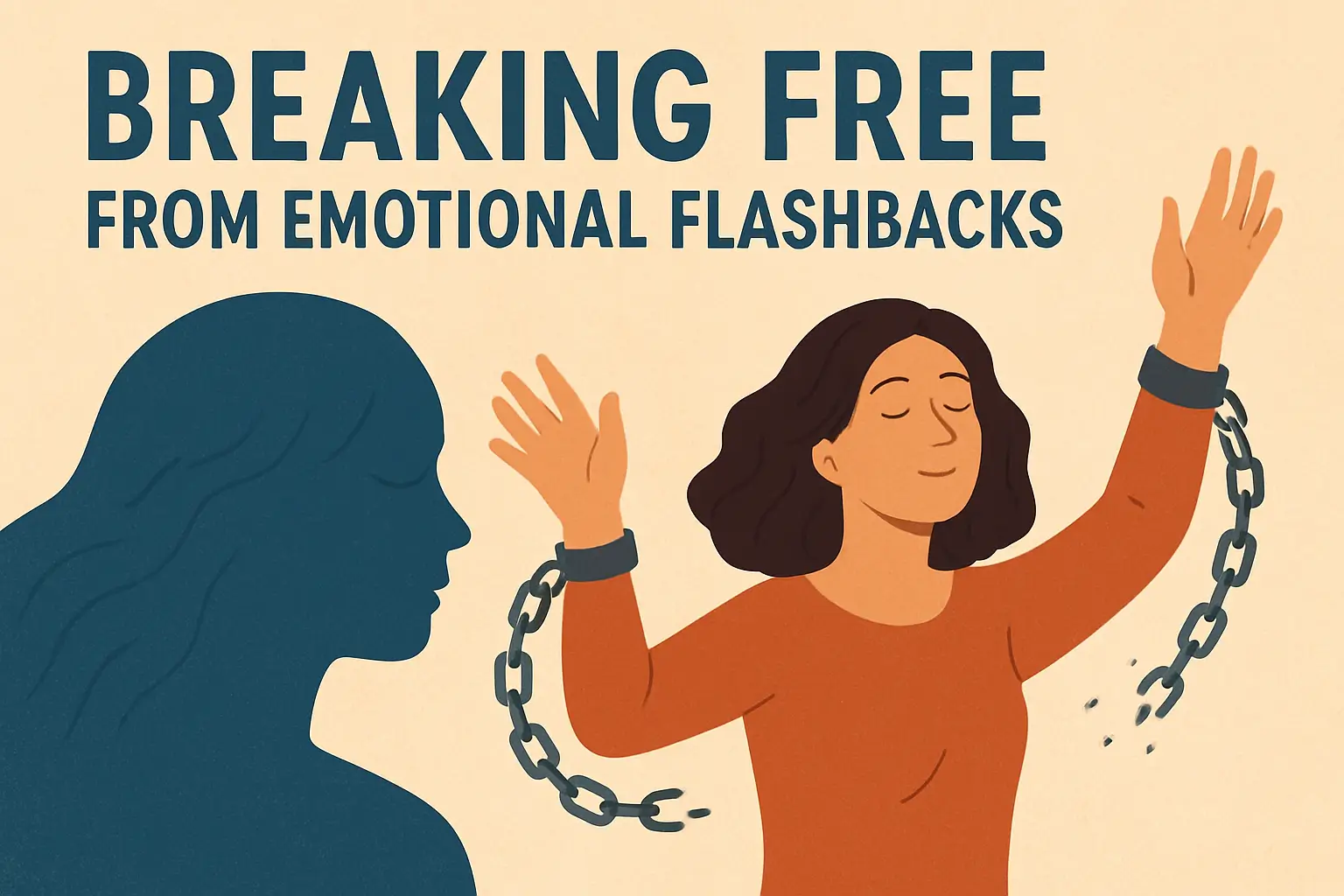
Emotional flashbacks can happen unexpectedly and take you to past pain in an instant. Heart racing! Mind spinning! And feeling like you are trapped. These are actual psychological responses, not just in your head. Allah reminds us in the Qur’an “Indeed, with hardship comes ease” (94:6). Every hardship has ease. No storm lasts forever. If you practice facing flashbacks you can stop them from taking over!
What Are Emotional Flashbacks?
Emotional flashbacks can be sudden episodic states in which it feels like your trauma is occurring again in real-time. You have no obvious memories, but you feel strong emotions. Whereas true memories typically just provoke the body’s alarm system, emotional flashbacks can trigger the alarm as if the danger is present.

Why They Happen
The brain ties it to earlier painful experiences in your life, usually without your conscious choice. In psychology, this is termed a ‘trauma trigger.’ It circumvents your logical, cognitive mind and jumps straight to your emotional brain. Even if the present moment is safe, your body may disagree. The religion of Islam also teaches that the heart and soul store experiences in a very deep way. The Qur’an states, “Verily, in the remembrance of Allah do hearts find rest” (13:28). This quote indicates how inner tranquility can protect you from a sudden barrage of storms.
Step 1 – Stop and Breathe
Once you identify a flashback, try to stop everything. Breathing is your safest action that will go from panic to calm. The Prophet Muhammad ﷺ taught a similar principle in the midst of stress, demonstrating the universal effectiveness of controlling your breath.

Step 2 – Bring Yourself Back to the Present
Flashbacks are very effective at convincing you that you are still in danger. Grounding you back in the present will help your mind return to the present moment. Take a look around and identify five things you can see. Touch something and feel its surface. Really listen for the quietest sound in your space.
These actions tell your brain that you are safe right now. Psychologists refer to these actions as “sensory grounding.” Grounding is a very effective way to separate the past from the present moment.
Step 3 – Be Compassionate to Yourself
When you are in a flashback your internal voice is very important. You need to speak to yourself in the same way you would speak to a friend who is caring. This is when you can say, “I am safe right now.” You are able to say, “This feeling will pass.” You can say, “Allah is with me.”
Step 4 – Replace the Old Story
Flashbacks are tied to painful stories you held as truth about yourself. You may have felt unsafe, unloved, or powerless at certain points. Today, you can rewrite that internal story. You can remind yourself of your inner strength, how you have grown, and Allah’s love.
The Prophet Muhammad ﷺ had many experiences of rejection and harm, but he carried hope and trust in Allah’s plan. You can also reframe the ways to understand your past. When you begin to do this, you give yourself the emotional freedom to move forward.
Case Study in Psychology
Let us consider a young woman, Aisha, whose upbringing was filled with mostly neglect. As an adult, Aisha had a fear of being on the “wrong end” of another person’s sudden temper. In meetings or conversations, if someone spoke loudly, Aisha would experience distant, extensive flashbacks to when she was much younger, feeling just as small and powerless each time.
Using therapy, and guided by her therapist, Aisha learned some grounding techniques and practicing self-talk with self-compassion. She also started a ‘trigger journal’ that allowed her to note patterns in her thoughts and feelings. After several months of keeping track, and noticing the previously described patterns, her flashbacks began to weaken and become less frequent. These observations also reflect that our brains can learn (or remember) safety with consistent practice.
Positive self-talk transforms your emotional state, interrupting the spiral of fear. The Qur’an says, “Despair not of the mercy of Allah” (39:53), emphasizing that even at the lowest point, there is hope.

Step 5– Identify the Trigger
You can plan your action before your panic can do the job of thinking for you, which is a positive way to have a panic attack, and learn from it! In nice round numbers psychologists think the awareness of triggers is “trigger awareness training” and this has a significant impact in decreasing the intensity of automatic reactions. Awareness is a place for the mind to take refuge.
Islamic Life Case Study
During the Caliphate of Umar ibn al-Khattab (RA), a man was still remembered his experience of slavery. When he heard the sound of chains, it distressed his heart. Umar (RA) spoke to him gently and reminded him that Islam has relieved not only his body but his soul.
He encouraged him to make an effort to practice dhikr each day to relieve his heart. And, this love had replaced his fear. Later, he was able to help others heal from emotional pain from similar issues. His example is evidence of the power of a spiritual context when dealing with emotional flashbacks.
Step 6 – Don’t go it alone.
When you experience emotional flash backs, do not go it alone. Create a safe place with a friend or counselor to help process your feelings. The terminology in psychology for a safe relationship is called a ‘secure base’ or a safe relationship for the purpose of rebuilding a sense of trust in the present.
Islam aligns with this. The Prophet ﷺ said “the believers are like one body”. This is a reminder that supporting each other is part of being a believer.
Read more : “10 Hidden Fears That Control us ”
Step 7 – Use Dhikr as a Stability Point
Dhikr means to remember Allah with the heart and tongue. Dhikr will slow down our racing thoughts and calm down our inner selves. Repeat and follow with SubhanAllah, Alhamdulillah, or Allah Akbar, and focus on your breath, and let the words immerge in your heart.
Step 8 – Train Your Mind Every Day
When you begin to control your flashbacks it will daylight from daily practice. Train your mind while in a state of calm. Engaging in these grounding exercises is not meant to be kept only for times when you need it but rather every single day. Even when you are just calm, practice your deep breathing. Work on replacing your previous stories with hopeful and positive stories.
From the Qur’an, “Indeed, Allah will not change the condition of a people until they change what is in themselves” (13:11) shows us that behavior change is actually only small daily behavioral changes which prepares us to face major challenges.
Conclusion
Emotional flashbacks aren’t forever sentences. They are chances to heal wounds from the past. Finding ways to be aware, ground yourself, engage in self-talk and trust that you can end them before they take over. Combine psychology and Islam and you have some very powerful tools for your recovery. You will never be able to stop yourself from feeling pain forever, but you can stop pain from controlling your life. With Allah’s help, you



Leave a Reply